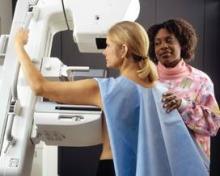The American Society of Clinical Oncology has issued updated recommendations for the follow-up care of breast cancer survivors, but made no changes from guidelines released in 2006.
The current guidelines include recommendations for all oncologists, primary care providers, and nurses who treat asymptomatic breast cancer survivors. They emphasize physical exams, patient history, and mammography, but discourage routine blood tests, biomarker studies, and other imaging in the absence of symptoms.
An American Society of Clinical Oncology (ASCO) panel reviewed the literature for studies that specifically focused on patient management for patients who had finished their primary therapy to cure breast cancer. The updated recommendations were published online Nov. 5 in the Journal of Clinical Oncology (doi: 10.1200/JCO.2012.45.9859).
Dr. James L. Khatcheressian, from the Virginia Cancer Institute in Richmond, and his associates on the ASCO Clinical Practice Guidelines Committee searched Medline and the Cochrane Library for all systematic reviews, clinical practice guidelines, and randomized controlled trials published between March 2006 and March 2012.
The committee primarily sought outcomes data on "disease-free survival, overall survival, health-related quality of life, reduced toxicity, and cost effectiveness." Its analysis of nine systematic reviews (including three meta-analyses) and five randomized controlled trials led the committee to conclude that no modifications to the clinical practice guidelines from 6 years ago were necessary.
The recommendations are as follows:
• Providers should give women a physical exam and history every 3-6 months for the first 3 years after they receive primary therapy. Then, a history and physical exam should be conducted every 6-12 months for the next 2 years, followed by annual ones.
• Women who had breast-conserving surgery should receive their first mammogram at least 6 months after completing radiation therapy, followed by a mammogram every 6-12 months. Once they achieve "stability of mammographic findings" after completing locoregional therapy, mammography can be done yearly.
• Women should be advised to do monthly breast self-exams and be educated about symptoms indicating possible cancer recurrence, such as lumps, bone pain, chest pain, dyspnea, abdominal pain, or persistent headaches.
• Those who meet the criteria for high risk of family breast cancer should be referred to genetic counseling. These criteria include "Ashkenazi Jewish heritage; history of ovarian cancer at any age in the patient or any first- or second-degree relatives; any first-degree relative with a history of breast cancer diagnosed before the age of 50 years; two or more first- or second-degree relatives diagnosed with breast cancer at any age; patient or relative with diagnosis of bilateral breast cancer; and history of breast cancer in a male relative."
• Women should also receive regular annual gynecologic care, except those who had a total hysterectomy or oophorectomy, who can have less frequent checkups. Women who take tamoxifen should be instructed to tell their doctor about any vaginal bleeding since they are at a higher risk for endometrial cancer.
Although the committee recommends continuous care by a doctor with experience in breast exams and cancer survivors, they note that "follow-up by a primary care provider seems to lead to the same health outcomes as specialist follow-up, with good patient satisfaction." Women with early-stage breast cancer wishing to be treated by their primary care provider may be transferred a year after diagnosis.
The clinical practice guidelines note that routine blood tests (CBC testing and chemistry panels), breast cancer tumor marker testing, and imaging studies besides mammograms are not recommended if patients have no symptoms. Chest x-rays, bone scans, liver ultrasounds, CT scans, 18F-deoxyglucose (FDG)–PET scans, and breast MRIs also are not recommended for standard follow-up care.
However, the committee stated that the practice guidelines are voluntary, and "do not account for individual variation among patients and may not reflect the most recent evidence." Therefore, management of each patient should depend on her case history and circumstances, and rely on the professional judgment of her doctor.
While the committee concluded that no new evidence warrants changes to the guidelines, it said that research is needed (in particular, randomized controlled trials) on comparative effectiveness of different surveillance strategies and duration of follow-up. It also called for more research into tumor marker testing and identification of patient subsets that would benefit from various models of care.
The article received no external funding. Lead author Dr. N. Lynn Henry has been paid for consultancy or advisory work for GE Healthcare. No other disclosures were reported.


